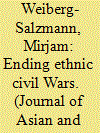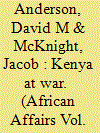| Srl | Item |
| 1 |
ID:
138118


|
|
|
|
|
| Summary/Abstract |
At the beginning of 21st century (ethnic) civil wars have been proliferate all over the world. Many ethnic conflicts – for example the conflict in Sri Lankan between the Sinhalese majority government and the guerrilla fighters of the Tamil minority – are characterized by constant efforts for conflict resolution interspersed with renewed violence, with cycles of military escalation and de-escalation. Also, they are marked by the helplessness of the international actors, who profess their interest in a resolution and try to mediate between the contending parties. But they are rarely successful – why? I assume that the most important question in war and peacetime is whether security is possible to achieve to prevent the security dilemma escalating. In many Asian and African countries people perceive politics and security in ethnic terms. Thus how a party defines security is of decisive importance concerning whether a conflict can end in peace or will be solved militarily. Within an exclusive security concept, security can only persist if the other is annihilated or oppressed by military means, while inclusive security concepts can achieve security by special arrangements, peace agreements or security guarantees. Third parties, who are engaged in mediating violent conflicts, have to keep in mind that it is the elusive balance of these security schemes which determine successful negotiations and at least a permanent solution. To reach a lasting peace it is not sufficient for external actors to provide security; in the long run, they must transform exclusive into inclusive security concepts.
|
|
|
|
|
|
|
|
|
|
|
|
|
|
|
|
| 2 |
ID:
137753


|
|
|
|
|
| Summary/Abstract |
Kenya’s invasion of southern Somalia, which began in October 2011, has turned into an occupation of attrition – while “blowback” from the invasion has consolidated in a series of deadly Al-Shabaab attacks within Kenya. This article reviews the background to the invasion, Operation Linda Nchi, and the prosecution of the war by Kenya’s Defence Forces up to the capture of the city of Kismayo and the contest to control its lucrative port. The second section discusses Al-Shabaab’s response, showing how the movement has reinvented itself to take the struggle into Kenya. We conclude that while the military defeat of Al-Shabaab in southern Somalia seems inevitable, such a victory may become irrelevant to Kenya’s ability to make a political settlement with its Somali and wider Muslim communities at home.
|
|
|
|
|
|
|
|
|
|
|
|
|
|
|
|
| 3 |
ID:
087139


|
|
|
|
|
| Publication |
2009.
|
| Summary/Abstract |
Intelligence failure leading to military defeat is often examined through an apportionment of guilt or blame. Yet the capacity of the Intelligence Cycle and to support contemporary military operations is coming under increasing pressure. Doctrinal developments, and the demands of new operational theatres, suggest its principles need to be fundamentally reconsidered. Understanding essential weaknesses in the Intelligence Cycle's structure is examined against a backdrop of the staff and doctrinal environments to which it is applied. From this, proposals for the Intelligence Cycle's future applicability - and consideration of an alternative model that may be followed - are made possible.
|
|
|
|
|
|
|
|
|
|
|
|
|
|
|
|